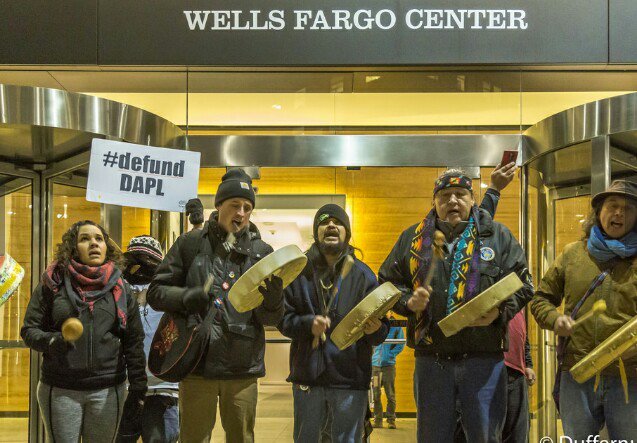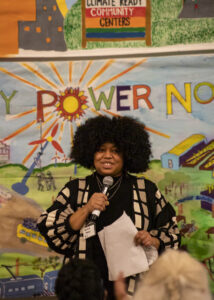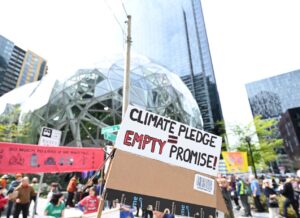For months, we have watched the bravery of the Standing Rock water protectors from afar—but now, with the City considering an anti-Wells Fargo ordinance, we can make a difference from right here in Seattle.

Rachel Heaton, Matt Remle, Jesse Nightwalker, Raymond L. Kingfisher and Paul Cheoketen Wagner outside of the Wells Fargo Center in downtown Seattle, January 5th 2017. Photo courtesy of John Duffy.
In November, Standing Rock leadership re-asserted a call to target the investors of the Dakota Access Pipeline: “We ask anyone that is considering traveling to join the encampments at Standing Rock to stay home for now and instead take bold action in your local communities to force investors to divest from the project,” wrote Honor the Earth, Indigenous Environmental Network and Camp of the Sacred Stones in a joint statement.
Since then, banners have been dropped from stadiums, celebrities have closed their accounts and a self-reported $47.5 million has been divested from the banks behind the project.
Here in Seattle we’ve risen to the challenge too: dozens have closed their accounts, protesters have disrupted branches, and last week some five hundred people rallied at Wells Fargo’s Seattle HQ.
Even more important, though, is the fact that the City of Seattle is now considering an ordinance to sever ties with Wells Fargo, owing, in large part, to the bank’s financial support of DAPL. If the ordinance passes, Seattle will be following in the footsteps of the Mille Lacs Band of Ojibwe and other tribal governments, who have already severed ties with Wells Fargo as a result of DAPL.
The Socially Responsible Banking Ordinance was drafted by Councilmember Sawant and Matt Remle, a Standing Rock Sioux tribal member who received the City of Seattle’s Human Rights Leader Award in 2014. Should the ordinance pass, Seattle would be the first major municipality to end its relationship with a bank because of the pipeline. And with an annual turnover of around $3 billion, that’s the sort of message that Wells Fargo executives will be listening to.
But the really exciting thing is that this has the potential to be far bigger than that, bigger than just Seattle.
Seattle was the first major city to raise the minimum wage to $15 an hour. Los Angeles, San Francisco, Washington, D.C, and the state of New York soon followed suit. This is what is going to have Wells Fargo executives really worried: the thought that Seattle divesting will inspire other cities to do likewise.
It does have them worried. I had a call recently with the program director of a large green NGO. The NGO in question has worked on the issue of the banks’ funding of fossil fuel projects for years. They have levels of access to the banking world unavailable to scrappy activists like us. When asked if he thought Wells Fargo were paying attention, the director laughed. “They’re more than paying attention…They’re terrified.” Wells Fargo, we heard, has an entire task force analyzing the #DeFundDAPL movement and working on DAPL.
Now it’s time to really scare them.
Once this ordinance is passed, we need to ensure that it’s exported to other cities. Plans are forming to do that, lists are being compiled: cities that bank with Wells Fargo, cities that have introduced fossil fuel divestment resolutions, cities that have passed Standing Rock resolutions.
And … well … let’s just say that if over the next few months half-a-dozen cities, with multi-billion dollar bank balances, start threatening to leaving Wells Fargo, that could change the equation: suddenly an investment in DAPL will start to look very different to Wells Fargo executives.
* * *
It’s clear that if enough of us — cities, individuals, businesses — speak up, and put our money where our values are, Wells Fargo and others will have no choice: business sense will mean they have to remove their funding from the pipeline.
If that happens, it could change everything.
While Wells Fargo is only responsible for around 5% of the financing behind the DAPL, if it pulls its loans, it paves the way for others to do likewise. And if enough of the funding leaves, well, the whole damn project collapses. That’s what #DeFundDAPL is all about.
First things first: we need to ensure that this ordinance passes in Seattle.
And there are several ways you can help do that, right now.
1) Email every City Council member and tell them that you support the Standing Rock Sioux and the socially responsible banking ordinance. You can do so in less than thirty seconds using this form letter
2) Call your City Council member and ask them to vote Yes on Council Bill 118883. And what d’ya know, you can even use this handy call script to do so.
3) Grab your #DeFundDAPL sign and come to the Finance Committee meeting on February 1st. Event details and RSVP are here.
Please take a few minutes to invite your friends and family to this hearing. It’s vital that we pack City Hall for this one, and show them how strong support for this ordinance is. You can prepare a two minute testimony by using these talking points.

Paul Cheoketen Wagner, Jan 5th 2017. Photo courtesy of Alex Garland
For months, many of us in Seattle have watched the Standing Rock fight from afar, moved and inspired, but entirely unsure of how we could really help, but now… now, with Seattle possibly being the first city to divest from the banks supporting the pipeline, we might just have the chance to really make our own small contribution to one of the most important struggles in American history.
I hope you will all take the time to do your part: Make those calls, send those emails, show up. That’s all you’ve got to do.









